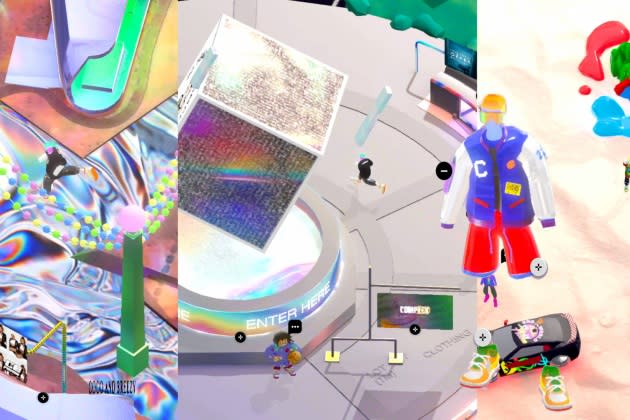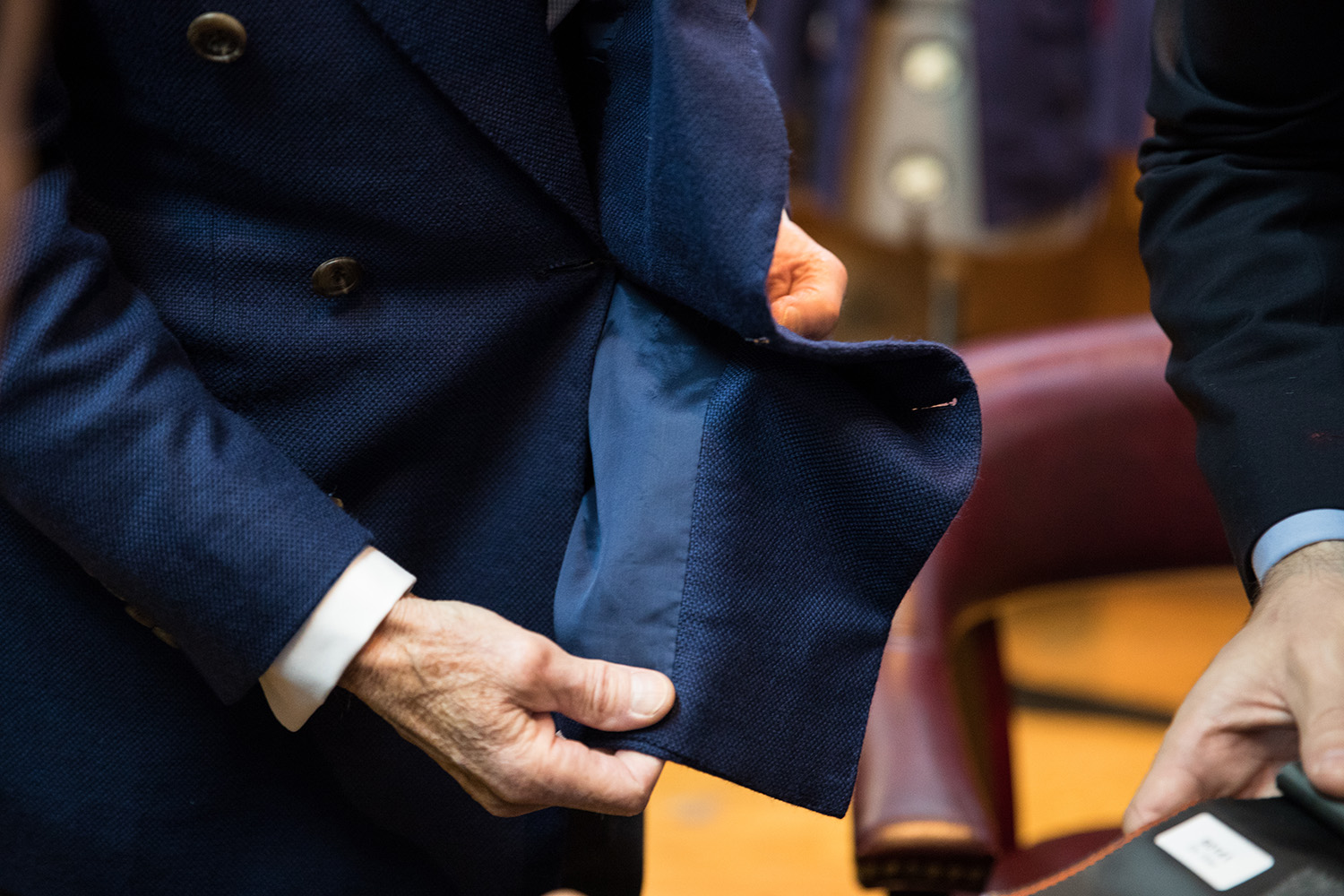[ad_1]

When Complex was first building ComplexLand, the virtual shopping experience created in 2020 to substitute for the popular ComplexCon shopping event due to the pandemic, words like “metaverse” and acronyms like “NFT” weren’t yet mainstream.
Then in January 2021, one month after the first ComplexLand experience, the mainstream media caught up to Web3.0, NFTs and all things in the metaverse as well as the gamified shopping experience that Complex developed in lieu of its revenue-generating ComplexCon.
More from WWD
Complex continued to mine its success in the virtual world earlier this month when it hosted ComplexLand 3.0 from Wednesday to Friday, with returning elements from its first iteration that included users creating an avatar they could take to virtual shops to buy from brands such as Atmos, Market, Billionaire Boys Club, Pacsun, Pleasures and Round Two.
At this edition, Complex also tapped sexual health campaign Healthysexual to curate the District section with five LGBTQ artists and designers — Willy Chavarria, Coco and Breezy Eyewear, Daniel Fletcher, K.ngsley and Fruitloots — and extended the partnership with UPS into the virtual world that began at ComplexCon in 2021 with a select group of emerging designers and underrepresented entrepreneurs, including Brownstone, Circulate, Colle and Compton Cowboys.
The event also featured NFT artworks by Chuck Styles, Naturel, Marly Mcfly, Numan Khan and Shantell Martin in an NFT Museum section.
“I was looking at the time spent on the platform and it’s much higher than last year and the bounce rate was much lower,” said Neil Wright, head of collaborations and experiential for Complex Networks. “People have a higher intent of participating. We tried to remove as many barriers, being free and accessible, logging in with email or a Facebook profile, and it seems like the people are excited to attend.”
PacSun, a longtime participant of ComplexCon, introduced its first activation in ComplexLand, which it sees as “a unique intersection between fashion, technology, community, music and gaming in the metaverse,” the brand said. ComplexLand helps the retailer expand its digital footprint beyond Pacworld in Roblox, PS the Game and its real estate purchase in Sandbox, and allows it to showcase its PS Mall Rats NFT series that was on display in the NFT Museum on Friday. “Our NFT Mall Rat feature in the museum gallery included an exclusive hype sneaker from partner PS Reserve with purchases,” the brand said.
“We exceeded our revenue goals in the first 18 hours, and are very pleased with our partnership with ComplexLand,” the retailer added. “Our audience is loving the ability to customize their own avatars and access their favorite brands — we featured exclusive drops from Cloud9 gaming, PS Reserve hype drops, and Playboy merch, alongside our Pacsun monogram capsule.”
Frequent ComplexCon participant Atmos activated at ComplexLand for the third time. The global retailer owned by Foot Locker sees ComplexLand as a testing ground for new products, like its branded apparel and collaborative products with New Balance, Be@rbrick and Fisk. The company also saw the event this year as an opportunity to explore the metaverse.
“This was our first opportunity to tap into the metaverse, which was super innovative for Complex to dive into so early with their first ComplexLand activation in 2020,” the retailer said. “It’s incredible to see how much the NFT space has exploded in the last two years. We’re now in the middle of launching our own Atmos NFT project and are excited for new ways to connect with consumers outside of the traditional brand/brick-and-mortar selling spaces.”
Martian Toys activated for the third time at ComplexLand featuring collaborations with Tokidoki ahead of its third activation at ComplexCon this year in November. The company also gave away free NFTs to consumers with select purchases.
“The response has always been great,” said Martian Toys wholesale manager Kevin Phillips. “We see the shopping experience ComplexLand delivers as the future of e-commerce — giving consumers an experience to go shopping versus just simply scrolling up and down a website. This is an immersive experience with our fans to experience shopping in a totally new way.”
Vandy rereleased its Kakigori shoes at a virtual booth that served as a precursor to its ComplexCon activation coming this year and the eventual introduction of VandyLand, the metaverse it is developing. “Since the metaverse is expanding, this is a great platform to start learning about it for beginners and also brand owners like us,” Vandy said.
ComplexLand is much more palatable today as Web3.0 and NFTs grow in conversation and in brand and consumer participation. In 2021, artists made millions of dollars from their digital artworks and collectibles, brands dabbled in the space by introducing their own NFTs and partnered with artists to create artworks with uses beyond just collecting. Cryptocurrencies and networks like Ethereum and Solana are mentioned regularly in conversation with top dog crypto Bitcoin and metaverses like Decentraland debuting their first fashion weeks.
The first iteration of ComplexLand looked like a video game with in-game purchases, which Wright said the younger generation is privy to with virtual goods, in-app purchases and downloadable content. But where ComplexLand sees an opportunity over gaming and the metaverse is what Wright describes as bridging “IRL with the URL,” one of Complex’s missions.
“I’ve got so many thoughts for the future and as we continue to develop the future of ComplexLand for 4.0,” Wright said. “If you can wear what your avatar is wearing, it’s different, especially for true gamers. It’s more fun that way. You want a tangible thing that’ll transcend the representations of you.”
A few innovations introduced in 2.0 that returned in this edition are the gamified aspects of the platform — users can collect coins in the virtual world and unlock new styles for their avatars, like an Adidas yeti suit hood or foam hats — and multiplayer, a regular part of gaming since the 1980s and 1990s, as a controller adapter that was built into the Nintendo 64 gaming console in 1996.
“We really wanted to make it a bit more of a video game where people will have more to do during the experience,” Wright said.
He explained that users in the first iteration were interacting and connecting on the chat, and feels that form of community was important. ComplexLand 3.0 also had a feature where visitors could invite 50 friends to shop and explore the world together without the other users and even host a private party within the world.
One feature that didn’t make it this time around was panel discussions. “People are there for shopping,” Wright said. “I didn’t involve any panels this go-around. We would receive post-show feedback and people came for the shopping and not the panels. They were pre-recorded and not live so I think if it was live the spontaneity would raise viewership. It becomes such an expensive experience and we really want to invest in the things the users want.”
Every year, ComplexLand has sections like Sunset Lagoon, The Boro and Astral Market, each with different brands and shops, but The District was redone in this edition and had an activation from UPS.
“We were the official shipping partner for ComplexLand,” said Betsy Wilson, vice president of digital marketing and brand activations at UPS. “We’re always looking for innovative ways to impact culture. The metaverse is a natural next place to go. We do a lot of training through virtual and augmented reality. The idea isn’t new to us, but marketing activations are.”
“UPS is doing a great job of assimilating,” Wright added. “At ComplexCon, they gave grants to key brands to participate and built out their activations and did a similar integration for ComplexLand. They’re a great utility partner and not an obvious fit in a lifestyle perspective but they’re so ingrained in the back end.”
And for the Healthysexual curated section, Wright said LGBTQ brands haven’t been a focus or well-represented at ComplexCon and ComplexLand over the years, but this section shines a spotlight on designers in streetwear and street culture. “It’s a really good way for us to make sure we’re as diverse as possible and give every underrepresented group a spotlight in the platform we’re building.”
Wright added about ComplexLand this year, “Web3.0 is supposed to be decentralized, but nothing is shared across platforms yet. From a commerce perspective, it’s compartmentalized. But if you can bridge physical with virtual, it’ll have a larger adoption rate.”
Sign up for WWD’s Newsletter. For the latest news, follow us on Twitter, Facebook, and Instagram.
[ad_2]
Source link


More Stories
How To Pick A Perfect Engagement Ring: A Comprehensive Guide
The Second Skin Advantage: How Compression Tops Help Boost Your Strength Training Performance
Fashion Icons You Need to Follow for Inspiration